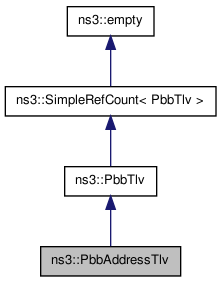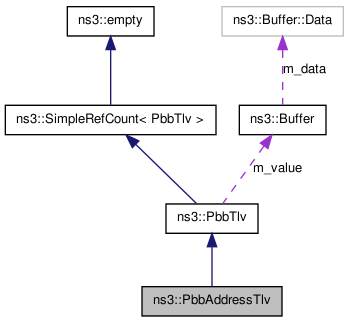#include <packetbb.h>


Public Member Functions | |
| void | SetIndexStart (uint8_t index) |
| Sets the index of the first address in the associated address block that this address TLV applies to. | |
| uint8_t | GetIndexStart (void) const |
| bool | HasIndexStart (void) const |
| Tests whether or not this address TLV has a start index. | |
| void | SetIndexStop (uint8_t index) |
| Sets the index of the last address in the associated address block that this address TLV applies to. | |
| uint8_t | GetIndexStop (void) const |
| bool | HasIndexStop (void) const |
| Tests whether or not this address TLV has a stop index. | |
| void | SetMultivalue (bool isMultivalue) |
| Sets whether or not this address TLV is "multivalue". | |
| bool | IsMultivalue (void) const |
| Tests whether or not this address TLV is "multivalue". | |
Detailed Description
An Address TLV.
Member Function Documentation
| uint8_t ns3::PbbAddressTlv::GetIndexStart | ( | void | ) | const |
- Returns:
- the first (inclusive) index of the address in the corresponding address block that this TLV applies to.
Calling this while HasIndexStart is False is undefined. Make sure you check it first. This will be checked by an assert in debug builds.
Reimplemented from ns3::PbbTlv.
| uint8_t ns3::PbbAddressTlv::GetIndexStop | ( | void | ) | const |
- Returns:
- the last (inclusive) index of the address in the corresponding PbbAddressBlock that this TLV applies to.
Calling this while HasIndexStop is False is undefined. Make sure you check it first. This will be checked by an assert in debug builds.
Reimplemented from ns3::PbbTlv.
| bool ns3::PbbAddressTlv::HasIndexStart | ( | void | ) | const |
Tests whether or not this address TLV has a start index.
- Returns:
- true if this address TLV has a start index, false otherwise.
This should be called before calling GetIndexStart to make sure there actually is one.
Reimplemented from ns3::PbbTlv.
| bool ns3::PbbAddressTlv::HasIndexStop | ( | void | ) | const |
Tests whether or not this address TLV has a stop index.
- Returns:
- true if this address TLV has a stop index, false otherwise.
This should be called before calling GetIndexStop to make sure there actually is one.
Reimplemented from ns3::PbbTlv.
| bool ns3::PbbAddressTlv::IsMultivalue | ( | void | ) | const |
Tests whether or not this address TLV is "multivalue".
- Returns:
- whether this address TLV is multivalue or not.
Reimplemented from ns3::PbbTlv.
| void ns3::PbbAddressTlv::SetIndexStart | ( | uint8_t | index | ) |
Sets the index of the first address in the associated address block that this address TLV applies to.
- Parameters:
-
index the index of the first address.
Reimplemented from ns3::PbbTlv.
| void ns3::PbbAddressTlv::SetIndexStop | ( | uint8_t | index | ) |
Sets the index of the last address in the associated address block that this address TLV applies to.
- Parameters:
-
index the index of the last address.
Reimplemented from ns3::PbbTlv.
| void ns3::PbbAddressTlv::SetMultivalue | ( | bool | isMultivalue | ) |
Sets whether or not this address TLV is "multivalue".
- Parameters:
-
isMultivalue whether or not this address TLV should be multivalue.
If true, this means the value associated with this TLV should be divided evenly into (GetIndexStop() - GetIndexStart() + 1) values. Otherwise, the value is one single value that applies to each address in the range.
Reimplemented from ns3::PbbTlv.
The documentation for this class was generated from the following file:
- src/node/packetbb.h
 1.7.1
1.7.1